9 Tips For Getting Out Of Bed In The Morning

- Why Is Sleep Important?
- How to Get Out of Bed in the Morning
- What Makes Getting Out of Bed in the Morning Hard?
- Wrapping Up: How to Get Out of Bed Early
Why Is Sleep Important?
You already know you need sleep because you feel horrible without it, but there are several reasons why sleep is important. First, sleep helps your body and mind rest and recharge after a long day, allowing you to feel refreshed. When you’re sick, your doctor may tell you to get more sleep because the body shuts down all non-essential functions to focus on repairing and fighting illnesses. Without enough sleep, you’ll feel groggy and moody the next day.
Quality sleep can improve performance and memory while helping fight inflammation. Consider the last time you didn’t get enough sleep or got poor-quality sleep. How did you feel? We bet you had difficulty getting out of bed and feeling motivated. Unfortunately, even though you can spend 8 hours in bed, it doesn’t mean you’re getting quality sleep.
To help you understand what quality sleep is, let’s discuss the stages of sleep—the sleep cycle your body follows every night. There are four stages altogether, with the first three stages consisting of non-rapid eye movement (NREM) and the final stage consisting of rapid eye movement (REM) sleep.
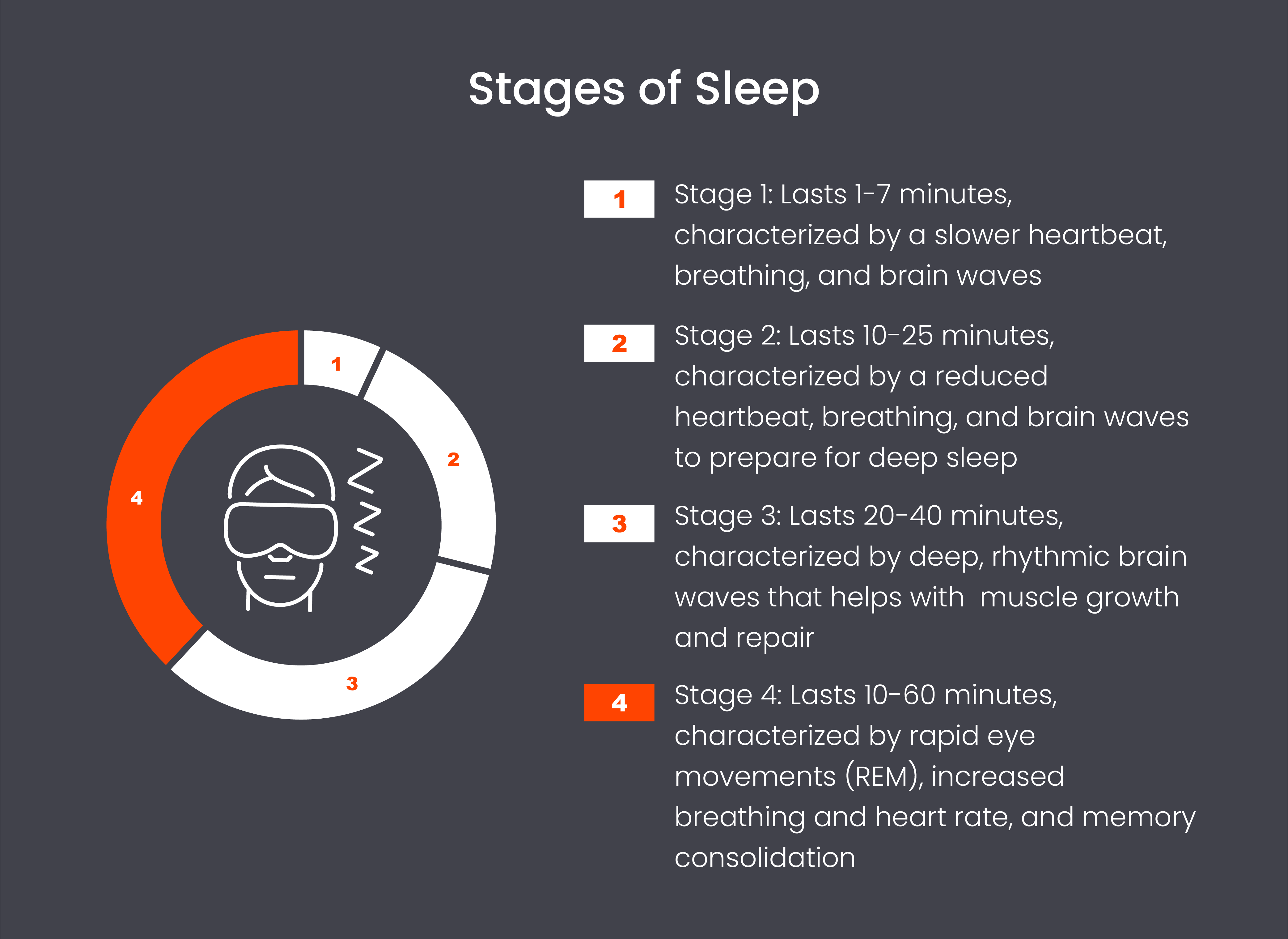
- Stage 1: During stage 1, your body gets ready to fall asleep and enters light sleep. Your body will slow heart rate, eye movements, breathing, and brain waves.
- Stage 2: During stage 2, you’re still in light sleep. However, your heartbeat, eye movements, body temperature, and breathing continue to slow.
- Stage 3: Stage 3 begins deep sleep, also known as slow-wave sleep, which typically occurs during the first half of the night. Stage 3 is responsible for making you feel refreshed and is characterized by prolonged, deep brain waves that make it challenging to wake up.
- REM sleep: What causes dreams? It’s stage 4 of the sleep cycle, also known as REM sleep. REM sleep is characterized by faster breathing, increased heart rate and blood pressure, memory consolidation, and dreaming. When you wake up during your REM sleep, you might be able to remember your dreams, but getting enough of this sleep is crucial because it can help you create and retain memories.
Most people who get enough sleep go through at least four sleep cycles a night, alternating between light, deep, and REM sleep. Deep sleep is crucial for helping you wake up feeling rejuvenated, but if you’re constantly getting woken up throughout the night, you might not get to stage 3.
How to Get Out of Bed in the Morning
Unfortunately, many people have disrupted sleep due to various factors, ranging from stress to health issues and insomnia. Getting out of bed in the morning when you haven’t had enough quality sleep is challenging. But even people who do get enough sleep may have difficulty getting up. Whether you’re wondering how to get out of bed early or want to wake up on time tomorrow, follow these quick tips:
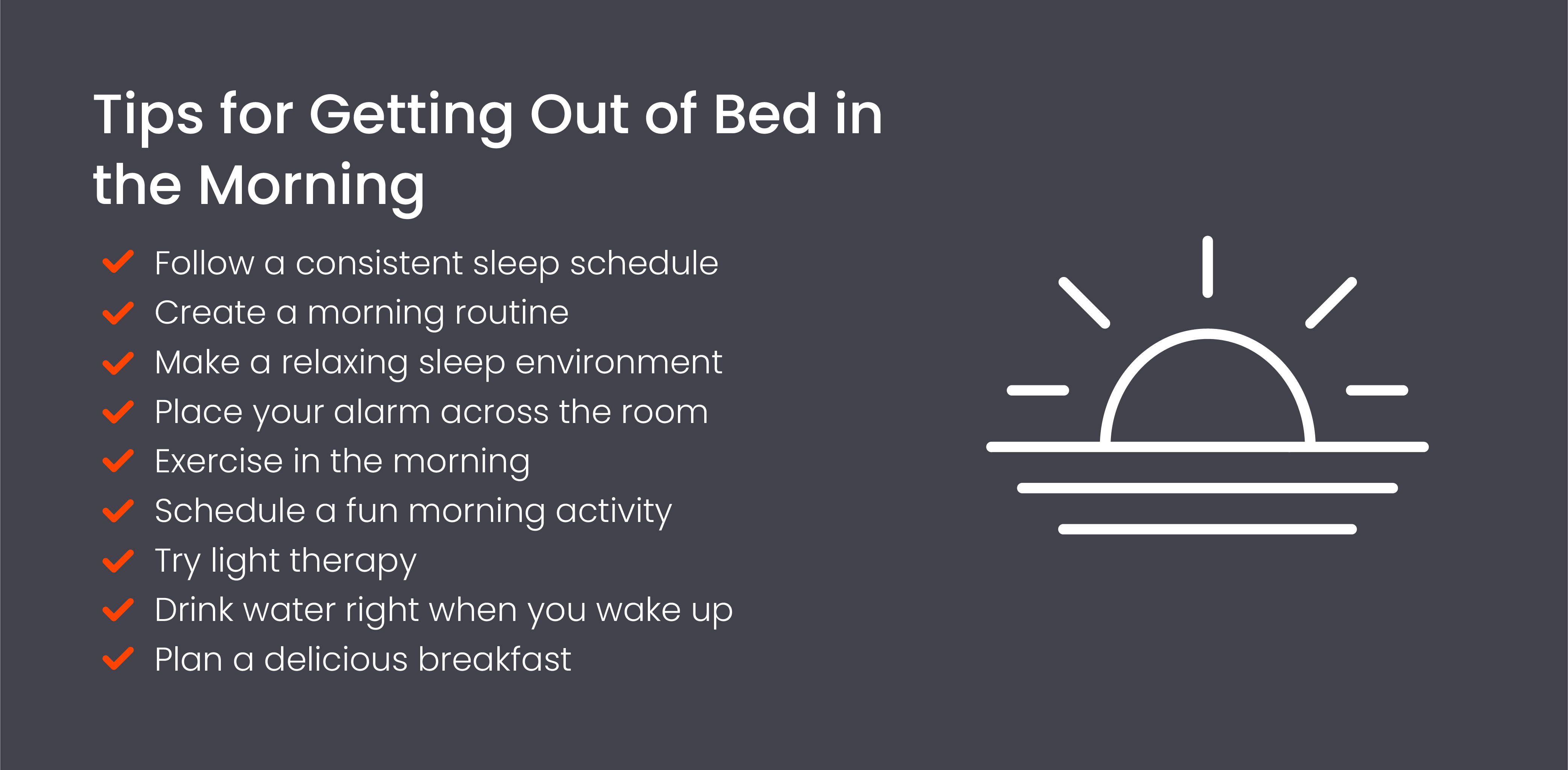
Follow a consistent sleep schedule
For those wondering how to make it easier to get out of bed in the morning, it’s important to remember that a sleep schedule is crucial to your overall sleep health. Good sleep hygiene means better sleep. However, you must follow a consistent schedule, which means no more sleeping in on weekends. Instead, you should go to bed and wake up at the same time every day. This might mean going to bed at midnight and waking up at 8 am if you’re a night owl. Meanwhile, if you’re an early bird, you might prefer to be in bed by 10 pm and wake up around 6 am. In either case, it’s crucial to follow the same schedule daily.
A sleep schedule will train your mind to help it fall asleep faster at night. When your body and mind realize you’re winding down for the night based on the time of day and your activities, they can prepare for sleep. Meanwhile, waking up at the same time offers similar benefits. The more of a routine you have, the more refreshed you’ll feel in the morning, making it much easier to get out of bed.
Most adults need an average of seven to nine hours of sleep every night. However, you may have to experiment to find the right times to fall asleep and wake up. For example, some people function better with seven hours of sleep, while some prefer the full nine.
Create a morning routine
While a sleep routine is essential, having a morning routine can help you start the day on the right foot. Instead of waking up a few minutes before leaving the house for work, consider waking up earlier to start a morning routine that allows you to relax and enjoy yourself in the morning. This might mean sitting down with a cup of coffee on your balcony or making a nutritious breakfast.
Your morning routine can be anything you want as long as it’s enjoyable. Instead of rushing, consider an activity you can do in the morning that sparks joy, such as reading, stretching, journaling, or exercising. Any of these activities can help you feel more motivated to get out of bed.
Of course, one thing you should never do when trying to get out of bed is to check your phone. Checking your texts or emails can increase stress and anxiety, making it difficult to get out of bed because you might be bombarded with a list of all the things you have to do that day. Additionally, checking your phone is a distraction that can prevent you from getting out of bed. Instead of standing up, you might start scrolling social media, which can suck up your time.
Make a relaxing sleep environment
If you want to know how to make it easier to get out of bed, you must always consider your sleep. A relaxing sleep environment will help you get better, deeper sleep to make waking up the following day easier. But, of course, many people have a stressful sleep environment that makes it challenging to fall asleep and stay asleep at night. Luckily, you can make some quick changes to your bedroom to improve your sleep quality and help you feel refreshed. Here are a few tips for improving your sleep environment.
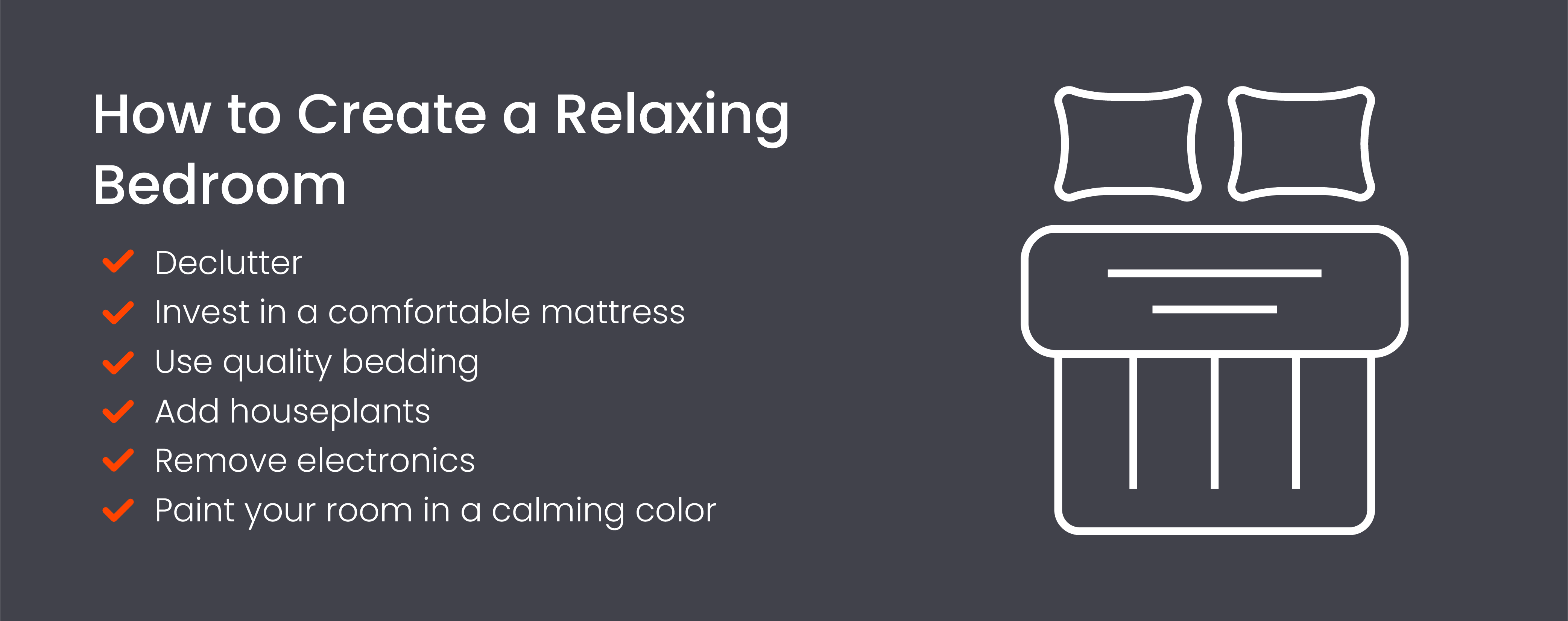
- Declutter your bedroom: Clutter causes stress. Having laundry piled around the room, dust, and other clutter can prevent you from getting a good night’s sleep because it’s a distraction. Decluttering your bedroom removes these distractions and can prevent you from injuring yourself if you get out of bed in the middle of the night for a glass of water.
- Invest in a comfortable mattress: Your mattress greatly affects your ability to fall asleep. If it has lumps or bumps or causes pain, it’s not the right mattress for you. Instead, consider investing in a new mattress based on your preferred sleeping position.
- Add houseplants: Believe it or not, adding a bit of greenery to your bedroom can help improve your overall sleep to make it easier to get out of bed in the morning. Some plants you may want to consider include pothos, snake plants, and spider plants.
- Use quality bedding: The right bedding has two functions: to regulate your body temperature and make you feel cozy. Many people can’t sleep without a blanket. However, if your blanket makes you too warm, sweating and overheating can cause you to wake up in the middle of the night. Consider changing your bedding based on the seasons. For example, opt for more breathable bedding like bamboo or cotton during the summer.
- Avoid having electronics in the bedroom: Consider swapping your phone alarm for a real alarm clock to avoid having electronics in the bedroom. Televisions, laptops, and smartphones are distractions that can keep you up past bedtime and prevent you from getting enough sleep.
- Paint your room in a calming color: As humans, we’re very sensitive to color, and the colors we surround ourselves with can impact how we feel. Painting your room in a calming color, such as a soft blue, can help you relax at night and fall asleep faster compared to more jarring colors like a deep red.
Place your alarm across the room
Wondering how to get out of bed in the morning quickly? Motivate yourself. No one likes the sound of their alarm clock, which is why you turn it off immediately after waking up. However, you can motivate yourself to stand up and get out of bed by putting your alarm clock across the room. When your alarm goes off, you’ll have no choice but to get out of bed to turn it off. Of course, even then, you can crawl back in it, but taking a few steps across the room can make you feel more awake and motivate you to keep going.
Exercise in the morning
Exercise is a great activity to add to your morning routine to help you feel more awake because it boosts energy. A morning workout will also improve your mood and confidence to help you make the most of your day. Additionally, once you add exercise to your routine and start realizing the benefits and how great you feel, you’ll feel more motivated to continue doing it every morning, which may be reason enough to get out of bed.
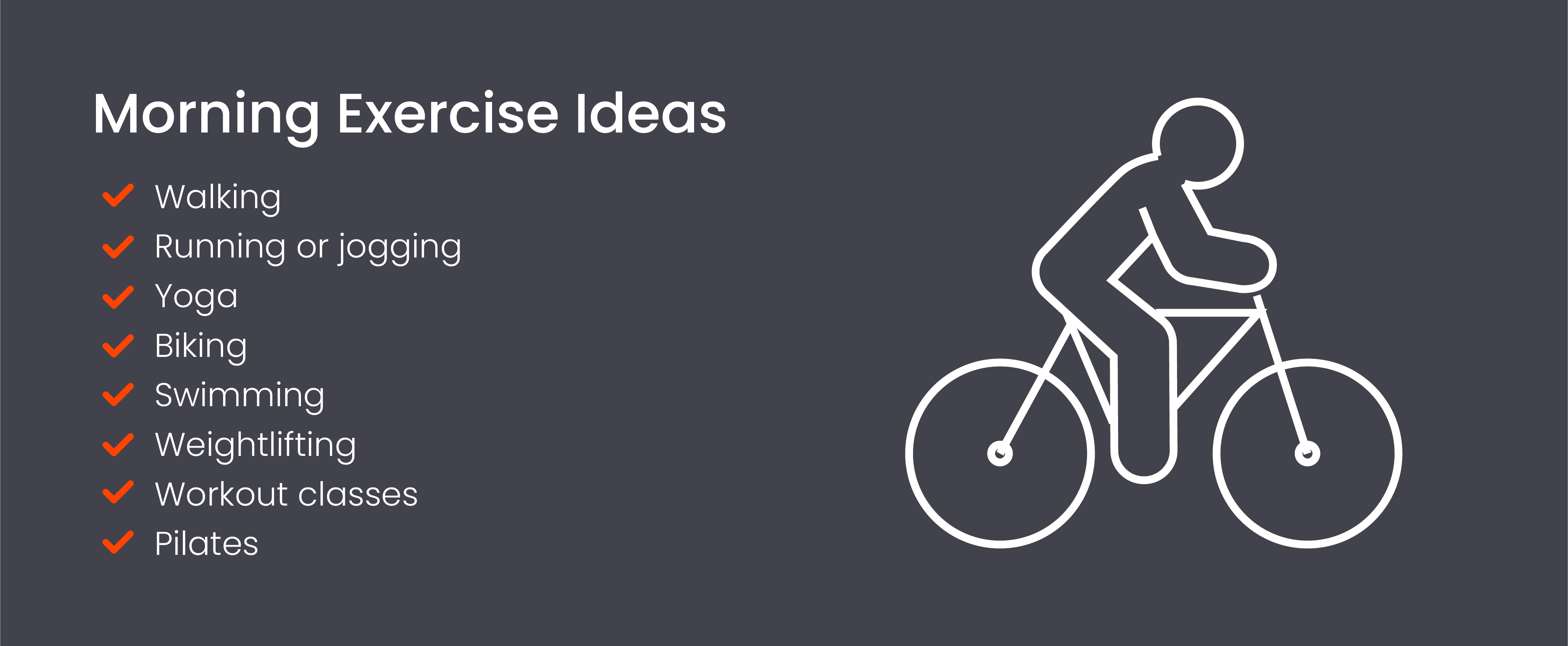
While some people prefer running in the morning, there’s no limit to the types of exercise you can do, as long as it’s something you enjoy. For example, you can walk your dog in the morning to help give you extra motivation (because Fido needs exercise, too!), or try different exercise classes at your local gym.
Schedule a fun morning activity
Getting out of bed is even more challenging when you don’t have a reason to do it. Unfortunately, going to work isn’t a good enough reason for many people to start waking up earlier to start a morning routine. That said, you can still give yourself a reason to wake up in the morning by doing something you enjoy, such as meeting a friend for a walk, playing with your dog or cat, reading, and so forth.
Try light therapy
Light therapy reduces the effects of winter fatigue many people get from dark, dreary winters with less sunlight. When it’s dark outside early (or all day in some parts of the country during the winter), your circadian rhythm can get thrown off because your body associates light with being awake and darkness with going to sleep. Therefore, when you wake up for work, and it’s dark out, your body might think it’s the middle of the night.
Light therapy is a way to combat this problem by exposing yourself to artificial light using a light therapy box. This therapy might be a way to realign your circadian rhythm and may help with sleep issues like insomnia, seasonal affective disorder (SAD), and depression. Luckily, you can do light therapy at home by purchasing a light therapy box or lamp and using it in the morning to help you feel more awake.
Drink water right when you wake up
Consider keeping a glass of water near your bed so you can hydrate as soon as you wake up. Hydration is crucial for all your bodily functions, and being hydrated can help you feel more awake throughout the day. Unfortunately, most of us wake up mildly dehydrated because we can’t drink water in our sleep. This dehydration can cause us to wake up tired, and if you don’t drink enough water during the day, you can experience headaches and fatigue.
Drinking water as soon as you wake up is crucial for helping the rest of your body wake up, so try to hydrate as soon as possible to feel your best in the morning.
Plan a delicious breakfast
If you’re a food-motivated person, consider planning a delicious meal for the morning to help you jump out of bed. Knowing what you’re going to eat and how delicious it will be might be enough for many people to wake up early to cook. In addition, a healthy breakfast is crucial for supplying your body with the nutrients it needs to stay energized for the rest of the day.
What Makes Getting Out of Bed in the Morning Hard?
You’re not alone if you have trouble getting out of bed in the morning. Many people don’t get enough quality sleep and wake up feeling tired even after spending eight hours in bed. Reasons for why it’s so difficult to get out of bed in the morning may include:
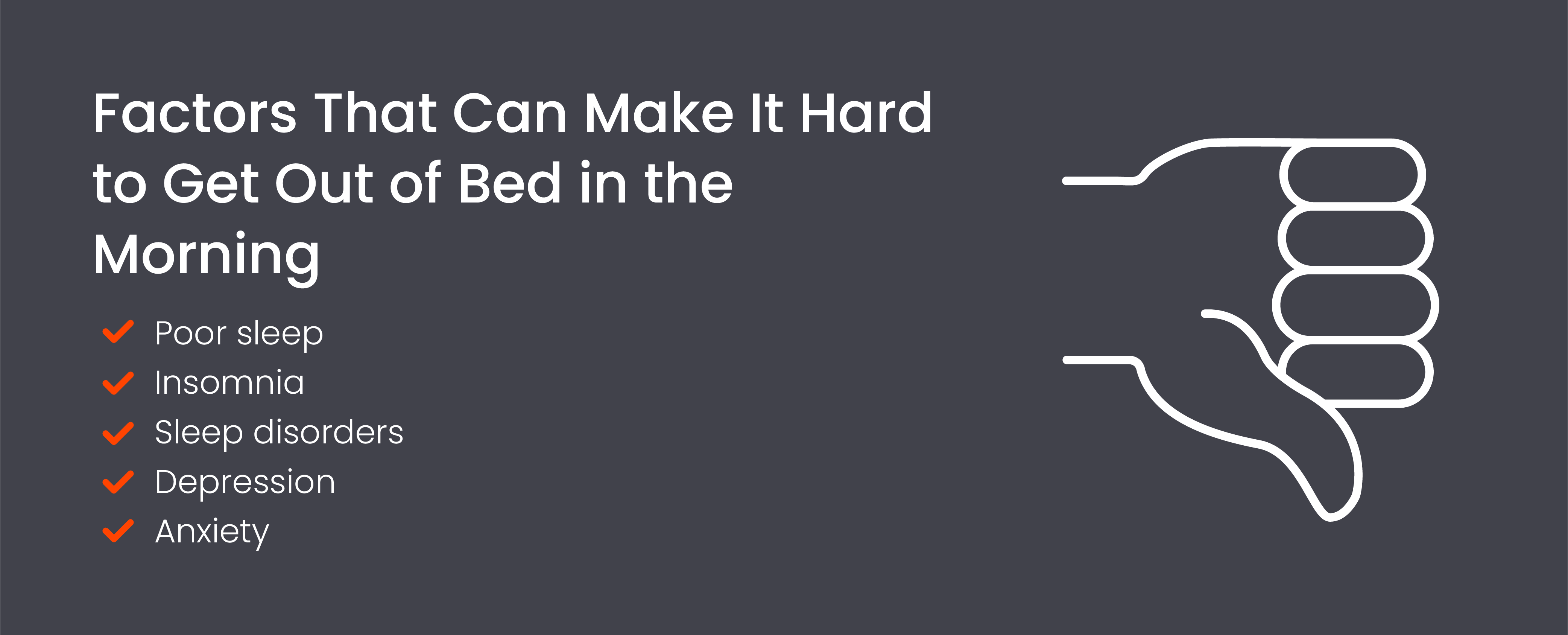
- Poor sleep: Poor sleep is the number one reason most people struggle to get out of bed in the morning. Unfortunately, you can’t always avoid poor sleep, and sometimes waking up in the middle of the night is something you have to do. For example, new parents must wake up throughout the night to soothe their infants. Other factors, such as stress, distractions, noise, and light, can cause poor sleep quality that affects your ability to enter deep sleep.
- Insomnia: Insomnia is a sleep disorder caused by factors ranging from poor sleep habits to chronic illness. Those who have insomnia have trouble falling asleep, staying asleep, and getting quality sleep, making it much more difficult to feel awake in the morning.
- Sleep disorders: Other sleep disorders, such as sleep apnea, sleepwalking, and restless legs syndrome (RLS), affect an individual’s sleep quality. For example, with sleep apnea, an individual stops breathing in the middle of the night, which usually wakes them up. Meanwhile, sleepwalking is linked to daytime sleepiness and fatigue, while RLS can worsen at night and disrupt sleep.
- Mental health issues: Mental health issues, such as depression and anxiety, can affect sleep quality. People with anxiety and depression may find falling asleep and staying asleep challenging. Additionally, these mental health concerns may make it challenging for individuals to find the motivation to get out of bed.
Wrapping Up: How to Get Out of Bed Early
Getting quality sleep is crucial, but learning how to get out of bed early in the morning might take trial and error. Everyone is different; what motivates you to get out of bed differs from what motivates your spouse, friends, and family. However, having a routine and good sleep hygiene can help your body and mind learn when it’s time to wind down and wake up to make it easier to fall asleep and wake up the next morning.

Of course, your environment also plays a role. For example, a lumpy, uncomfortable mattress will make it difficult to fall asleep and stay asleep, and many can cause pain that affects your ability to get out of bed in the morning. If you’re having trouble falling asleep because your mattress is uncomfortable, it might be time for a new one. Layla’s Memory Foam and Hybrid Mattresses can improve your sleep quality to help you achieve deeper sleep and feel more well-rested in the morning. Order yours today.






